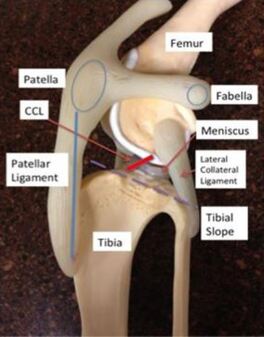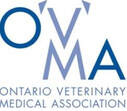Cruciate Surgery

What is the Cranial Cruciate Ligament (CCL)
The cranial cruciate ligament (CCL) is known as the anterior cruciate ligament
or ACL, in humans. CCL is one of the many ligaments in the stifle (knee)
that connect the femur bone to the tibia bone. The role of the CCL is to
stabilize the knee when in motion.
The CCL has 3 main functions:
Why Does the CCL Rupture?
CCL Rupture is one of the most common reason for Hind limb lameness, pain and could lead to knee arthritis. This is a much more complex problem in dogs than humans; as they experience either a partial or complete rupture of the CCL. Factors that can contribute to CCL can vary:
Are there any other parts of the joint affected when the CCL ruptures?
YES, the medial meniscus (MM) you can see in the diagram is a fibrous pad in between the Femur and Tibia, it acts to cushion the inside of the joint during movement. The MM is often damage after prolonged instability of the joint (CCL rupture) without the support of the CCL, the femur puts abnormal pressure on the MM which can lead to tearing, shredding the meniscus. The sooner you recognize your pet is in pain from a rupture CCL, the better the outcome for the MM and future issues like arthritis.
Signs and Symptoms:
Diagnosis
Good news vets can easily diagnosis CCL issue by doing a physical exam, looking at gait (walking) and Radiographs (x-rays).
The vet will perform special palpation techniques to assess the CCL, these palpations can confirm abnormal movement of the knee that is consistent with a rupture. It can be more difficult to diagnosis a partial CCL tear, could possible manage it with non-surgical treatment.
Treatment
There are many treatment options for CCL, the vets first major decision will be does this need surgery or can it be managed medically. We will discuss the best option for your pet and it will depend on your pets activity level, size, age, predisposed skeletal issues, degree of knee instability and the level of pain your pet is in.
Medical Management
Can be a combination of pain meds, exercise restrictions, joint supplements, rehabilitation and laser therapy. Here at Westmount we are fortunate to have Dee Hanson who is a certified Rehabilitation specialist; she can offer rehabilitation care and laser treatment. Our vets will discuss a treatment plan if medical management is the best option for your pet.
Surgical Treatment
This is typically the best treatment as it is the only way to permanently control the instability in the knee joint. The CCL has no ability to heal once tearing begins. In humans they will use a graft, this is one of the complex differences between humans and dogs, as grafts technique is less reliable in dogs. You could also be dealing with Meniscal injury, the pad between the femur and tibia which offers cushioning of the knee joint (see picture). Dogs often get Meniscal injury because prolonged instability of the joint; the faster we address any hind leg lameness or pain decreases the damage of the Meniscal pad. The success rate with Surgery is about 90% Dr. Matt Shany is certified to perform Extra-capsular stabilizing surgery since 2009. This technique is also known as the fishing line technique is very popular. The goal is to mimic the function of the ruptured CCL with a suture placed where the ligament once was.
There are other surgical options available such as TPLO or TAA, our vets will discuss what it the best option for your pet. If you would like more information on CCL and Surgical options please visit the American College of Veterinary Surgeons.
If you notice any of the above signs and it seems like your pet is having difficulty with their rear legs.
Call us or book an appointment so we can take a look and discuss the best plan for your pet.
The cranial cruciate ligament (CCL) is known as the anterior cruciate ligament
or ACL, in humans. CCL is one of the many ligaments in the stifle (knee)
that connect the femur bone to the tibia bone. The role of the CCL is to
stabilize the knee when in motion.
The CCL has 3 main functions:
- prevent displacement
- prevent hyperextension of the knee
- prevent rotation of the knee
Why Does the CCL Rupture?
CCL Rupture is one of the most common reason for Hind limb lameness, pain and could lead to knee arthritis. This is a much more complex problem in dogs than humans; as they experience either a partial or complete rupture of the CCL. Factors that can contribute to CCL can vary:
- aging and degeneration of the ligament
- Obesity
- Poor Physical Condition
- Genetics
- Predisposed skeletal problems like Hip Dysplasia
- Breed like (Rottweiler, Newfoundland, Staffordshire Terrier, Mastiff, Akita, St. Bernard, Retrievers)
Are there any other parts of the joint affected when the CCL ruptures?
YES, the medial meniscus (MM) you can see in the diagram is a fibrous pad in between the Femur and Tibia, it acts to cushion the inside of the joint during movement. The MM is often damage after prolonged instability of the joint (CCL rupture) without the support of the CCL, the femur puts abnormal pressure on the MM which can lead to tearing, shredding the meniscus. The sooner you recognize your pet is in pain from a rupture CCL, the better the outcome for the MM and future issues like arthritis.
Signs and Symptoms:
- Difficulty rising from sitting
- Trouble jumping into car
- Decreased activity level
- Lameness (limping) of variable severity
- Muscle atrophy ( decrease of muscle mass, one leg will look smaller than the other)
- Decrease range of motion of the knee joint
- Popping noise which may indicate a MM tear
- Swelling on the inside of tibia (shine bone)
- Pain
- Uninterested in playing
- Stiffness
Diagnosis
Good news vets can easily diagnosis CCL issue by doing a physical exam, looking at gait (walking) and Radiographs (x-rays).
The vet will perform special palpation techniques to assess the CCL, these palpations can confirm abnormal movement of the knee that is consistent with a rupture. It can be more difficult to diagnosis a partial CCL tear, could possible manage it with non-surgical treatment.
Treatment
There are many treatment options for CCL, the vets first major decision will be does this need surgery or can it be managed medically. We will discuss the best option for your pet and it will depend on your pets activity level, size, age, predisposed skeletal issues, degree of knee instability and the level of pain your pet is in.
Medical Management
Can be a combination of pain meds, exercise restrictions, joint supplements, rehabilitation and laser therapy. Here at Westmount we are fortunate to have Dee Hanson who is a certified Rehabilitation specialist; she can offer rehabilitation care and laser treatment. Our vets will discuss a treatment plan if medical management is the best option for your pet.
Surgical Treatment
This is typically the best treatment as it is the only way to permanently control the instability in the knee joint. The CCL has no ability to heal once tearing begins. In humans they will use a graft, this is one of the complex differences between humans and dogs, as grafts technique is less reliable in dogs. You could also be dealing with Meniscal injury, the pad between the femur and tibia which offers cushioning of the knee joint (see picture). Dogs often get Meniscal injury because prolonged instability of the joint; the faster we address any hind leg lameness or pain decreases the damage of the Meniscal pad. The success rate with Surgery is about 90% Dr. Matt Shany is certified to perform Extra-capsular stabilizing surgery since 2009. This technique is also known as the fishing line technique is very popular. The goal is to mimic the function of the ruptured CCL with a suture placed where the ligament once was.
There are other surgical options available such as TPLO or TAA, our vets will discuss what it the best option for your pet. If you would like more information on CCL and Surgical options please visit the American College of Veterinary Surgeons.
If you notice any of the above signs and it seems like your pet is having difficulty with their rear legs.
Call us or book an appointment so we can take a look and discuss the best plan for your pet.



